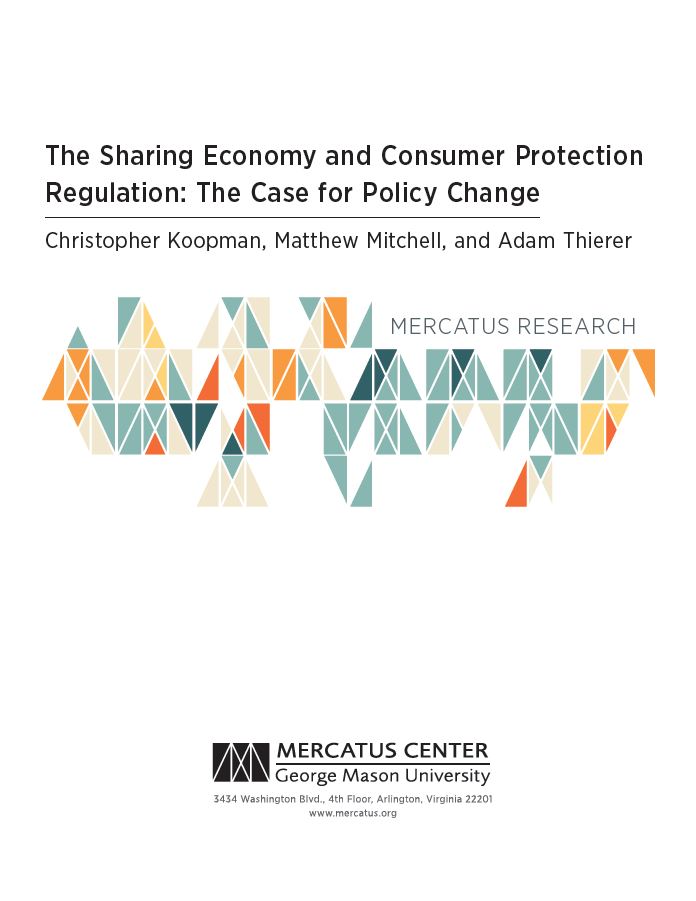 I’ve just released a short new paper, co-authored with my Mercatus Center colleagues Christopher Koopman and Matthew Mitchell, on “The Sharing Economy and Consumer Protection Regulation: The Case for Policy Change.” The paper is being released to coincide with a Congressional Internet Caucus Advisory Committee event that I am speaking at today on “Should Congress be Caring About Sharing? Regulation and the Future of Uber, Airbnb and the Sharing Economy.”
I’ve just released a short new paper, co-authored with my Mercatus Center colleagues Christopher Koopman and Matthew Mitchell, on “The Sharing Economy and Consumer Protection Regulation: The Case for Policy Change.” The paper is being released to coincide with a Congressional Internet Caucus Advisory Committee event that I am speaking at today on “Should Congress be Caring About Sharing? Regulation and the Future of Uber, Airbnb and the Sharing Economy.”
In this new paper, Koopman, Mitchell, and I discuss how the sharing economy has changed the way many Americans commute, shop, vacation, borrow, and so on. Of course, the sharing economy “has also disrupted long-established industries, from taxis to hotels, and has confounded policymakers,” we note. “In particular, regulators are trying to determine how to apply many of the traditional ‘consumer protection’ regulations to these new and innovative firms.” This has led to a major debate over the public policies that should govern the sharing economy.
We argue that, coupled with the Internet and various new informational resources, the rapid growth of the sharing economy alleviates the need for much traditional top-down regulation. These recent innovations are likely doing a much better job of serving consumer needs by offering new innovations, more choices, more service differentiation, better prices, and higher-quality services. In particular, the sharing economy and the various feedback mechanism it relies upon helps solve the tradition economic problem of “asymmetrical information,” which is often cited as a rationale for regulation. We conclude, therefore, that “the key contribution of the sharing economy is that it has overcome market imperfections without recourse to traditional forms of regulation. Continued application of these outmoded regulatory regimes is likely to harm consumers.”
We note that this is especially likely to be the case when the failure of traditional regulatory models is taken into account. As we document in the paper, all too often, well-intentioned “public interest” regulation is often captured by industry and used to to serve their interests:
by limiting entry, or by raising rivals’ costs, regulations can be useful to the regulated firms. Though regulations often make consumers worse off, they are often sustained by political pressure from consumer advocates because they can be disguised as “consumer protection.”
We provide evidence of the problem of regulatory capture and note it has been a particular problem in many of the sectors that are now being disrupted by sharing economy innovators–such as taxi and transportation services. It is evident that regulation has not lived up to its lofty expectations in many sectors. Accordingly, when market circumstances change dramatically—or when new technology or competition alleviate the need for regulation—then public policy should evolve and adapt to accommodate these new realities.
Of course, many bad laws and regulations that policymakers remain on the books and have constituencies who will defend them vociferously. Our paper concludes with some recommendations for how to “level the regulatory playing field” in a pro-consumer, pro-innovation fashion. We note that while differential regulatory treatment of incumbents and new entrants does represent a potential problem, there’s a sensible, pro-consumer and pro-innovation way to solve that problem:
such regulatory asymmetries represent a legitimate policy problem. But the solution is not to punish new innovations by simply rolling old regulatory regimes onto new technologies and sectors. The better alternative is to level the playing field by “deregulating down” to put everyone on equal footing, not by “regulating up” to achieve parity. Policymakers should relax old rules on incumbents as new entrants and new technologies challenge the status quo. By extension, new entrants should only face minimal regulatory requirements as more onerous and unnecessary restrictions on incumbents are relaxed.
Download this new paper on the Mercatus website or via SSRN or ResearchGate. Incidentally, we plan to release a much longer Mercatus Center white paper early next year that will explore reputational feedback mechanisms in far greater detail and explain how these systems help address the problem of “asymmetrical information” in these and other contexts.
______________
Also see: “The Debate over the Sharing Economy: Talking Points & Recommended Reading,” which includes the following video of me on the Stossel Show discussing these issues recently.

 The Technology Liberation Front is the tech policy blog dedicated to keeping politicians' hands off the 'net and everything else related to technology.
The Technology Liberation Front is the tech policy blog dedicated to keeping politicians' hands off the 'net and everything else related to technology.